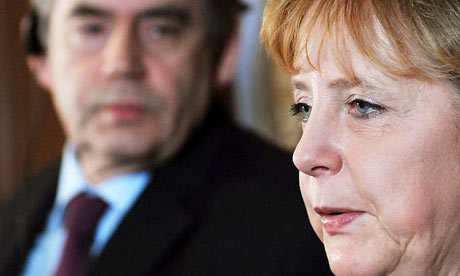Germany and France reject Brown's global economic recovery plan
Angela Merkel insists any further short-term fiscal stimulus should be up to individual governments, not the G20
- guardian.co.uk, Saturday 14 March 2009 17.34 GMT
-
 larger | smaller
larger | smaller - Article history

Gordon Brown and Angela Merkel brief journalists at 10 Downing Street earlier today. Photograph: Steffan Rousseau/Reuters
Gordon Brown's hopes of uniting the world's most powerful economies behind a massive new package of tax cuts and public spending increases were in ruins today after he failed to persuade France and Germany to back his plan to revive the world economy.
After talks at Chequers to prepare the way for next month's G20 summit in London, Angela Merkel, the German chancellor, ruled out ordering another short-term "fiscal stimulus" and made it clear that if more action was needed, it would for the Berlin's Bundestag to decide, not the G20.
Her comments were echoed by the French finance minister, Christine Lagarde, at a meeting of G20 finance ministers in Horsham, West Sussex. As ministers tried to agree a joint way forward, Lagarde said she was optimistic the meeting could make progress but that nations needed to "evaluate the remedies already put in place by each of us" before ordering huge extra spending on top of that already sanctioned.
The remarks effectively killed off proposals being pushed jointly by Brown – who will chair the G20 summit on 3 April – and the US president, Barack Obama, whose new adminstration believes that more co-ordinated fiscal action by the world's biggest economies is essential to revive global demand.
Standing alongside Brown at a press conference in Downing Street, Merkel said she was sure that the G20 – made up of the world's biggest industrial and developing countries, which account for 85% of the world economy – would yield "concrete results".
But when asked if she would back further tax cuts and spending increases, Merkel insisted Germany had agreed its own stimulus package worth 4.2% of the country's GDP – far higher than that ordered by the UK – and that she wanted to see what the effects would be before thinking about doing any more.
"Nothing has actually taken effect on the ground yet," she said. "If we want to make real impact, you really must implement the package first before you talk about the next step."
Merkel explained that Germany's generous social security system provides higher levels of financial help to people who are struggling in a recession than is the case in other countries, including the US. This meant that Germans were supported in bad times – but at a heavy cost to government. Any further tax and spending decisions would have to be put to MPs in the national government. "We will talk to our parliamentarians about that," she stressed.
Germany agreed in January to a €50bn stimulus package, including investment in infrastructure projects and education, incentives for new car purchases and one-off payments of €100 for every child.
Berlin and Paris are reluctant to go further, fearing the effects that an accumulation of debt across the EU could have on the credibility of the euro, whose members are supposed to keep spending and debt within strictly defined limits.
Brown insisted that G20 countries had already agreed the "biggest fiscal stimulus in history" and said the need for more action would be kept under "review". He said Merkel agreed on the need for tougher regulatory control of the financial markets and hedge funds – moves that he was confident that Washington would also back.
"I believe the Americans are ready to support us in this change that we are going to bring about," said the prime minister.
The Tories said the remarks from Merkel and Lagarde were evidence that Brown was failing to unite the G20 behind his ideas. "Central to Gordon Brown's attempt to draw a political dividing line with the Conservatives in the run-up to the budget has been his claim that the whole world is signed up to yet more debt-funded fiscal stimulus. That plan, which he hoped the G20 summit would provide cover for, is falling apart," said George Osborne, the shadow chancellor.
Alistair Darling, the chancellor of the exchequer, sought to play down fundamental differences between the US and Europe about how to tackle the deepening global recession.
"We are aware of the fact that around the world, most developed countries have already put in place quite substantial measures to help their economies," Darling said. "It must be for individual countries to decide what is right for them. What is equally important, though, is that we all do whatever it takes, whatever is necessary, and for as long as it takes." The ministers agreed to ask the IMF to examine the effectiveness of the fiscal stimulus policies that have already been put in place.
Finance ministers and central bankers said the IMF's resources should be increased "very substantially", from their current level, to prevent developing countries suffering disproportionately from the credit squeeze; but they offered no immediate commitment to provide new funds. "We did not seek to reach agreement on a number," the chancellor said.
Britain had hoped to secure agreement on a global "new deal", involving massive public investment, a substantial injection of cash into the IMF to help it bail out crisis-hit governments and tough new rules for the financial sector.
Treasury sources claimed the chancellor had forged consensus on the "principle" of a fresh fiscal stimulus, but there was little detail in the communique issued by the finance ministers after two days of talks.
Obama's treasury secretary, Tim Geithner, has backed calls by the Washington-based IMF for a co-ordinated global spending plan, worth up to 2% of GDP, to kick-start demand, echoing Washington's $800bn-plus fiscal stimulus.
Darling is drawing up plans to deliver a new fiscal boost at his budget next month and hopes to receive international endorsement for his plans.

No comments:
Post a Comment